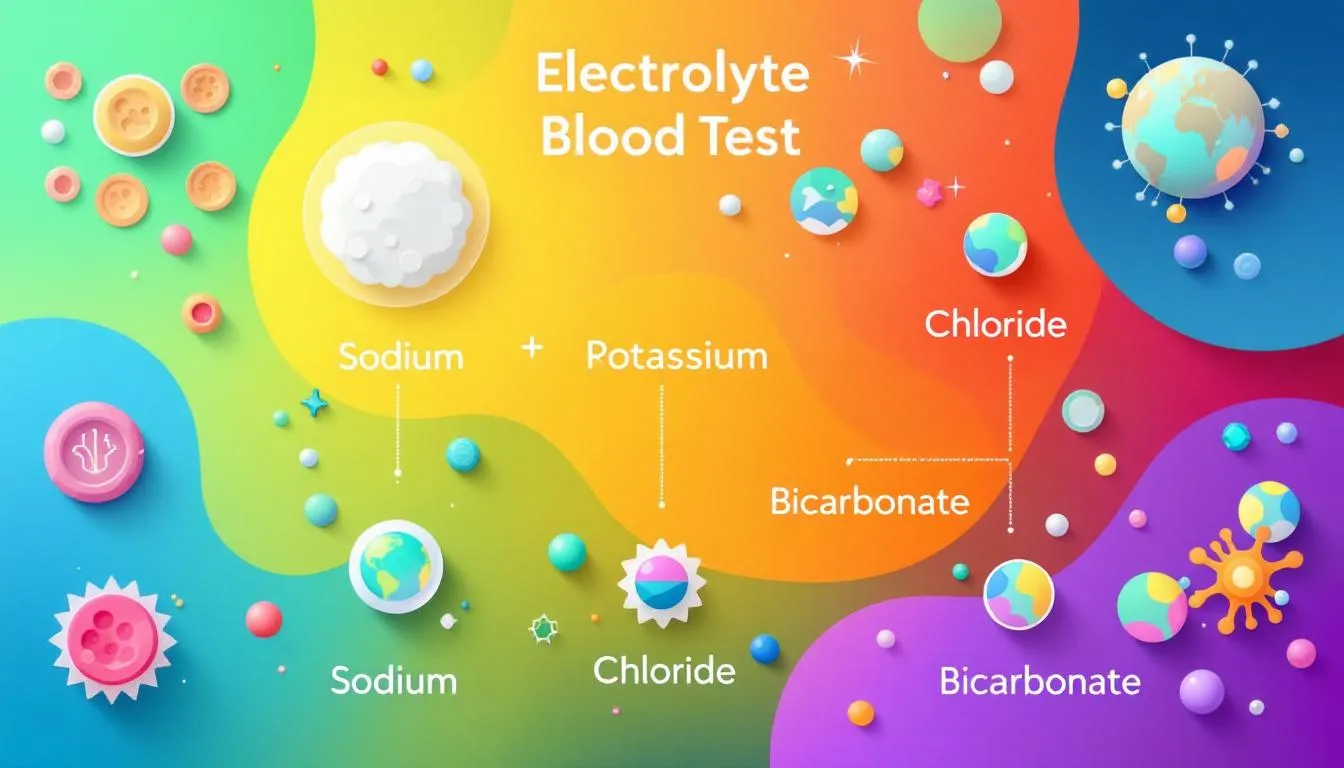An electrolyte blood test measures key minerals in your blood, crucial for muscle and nerve function, including electrolytes in blood test results. This article will help you understand the test’s purpose, what to expect, and how it can reveal important health information.
Key Takeaways
- Electrolytes are essential minerals that regulate bodily functions, including nerve signaling and muscle contraction, and maintaining proper levels is crucial for overall health.
- An electrolyte blood test evaluates the levels of key electrolytes, helping to detect imbalances that may indicate underlying health issues such as kidney dysfunction or metabolic acidosis.
- Regular monitoring of electrolyte levels is critical for individuals with chronic conditions, as it aids in early detection and management of imbalances to prevent severe complications.
What are electrolytes and why they matter?

Electrolytes, minerals found in body fluids, carry an electrical charge when dissolved in water. The main electrolytes in the human body include one or more electrolytes:
- Sodium
- Potassium
- Bicarbonate
- Chloride Each plays a pivotal role in maintaining our health. These minerals, including dissolved salts, can be found in the fluid portion of our body’s cells and blood, as well as in the extracellular fluid, ensuring that our body functions smoothly. Positive ions are essential for these processes.
One of the critical roles of electrolytes is to maintain electrical neutrality in cells, which is essential for generating and conducting nerve and muscle action potentials. Key functions of electrolytes include several basic body functions:
- Sodium and potassium are key players in nerve signaling and muscle contraction, as sodium retains sodium.
- Bicarbonate maintains the body’s pH balance.
- Electrolytes influence hydration and blood pressure by balancing the body’s fluids.
Without this balance, muscles, including the heart, wouldn’t function correctly.
An electrolyte imbalance can have serious repercussions. Dehydration, for example, can lead to disturbances in muscle function and nerve signaling due to the loss of electrolytes. This imbalance can cause symptoms ranging from mild fatigue to severe heart, muscle weakness, and neurological issues. Thus, maintaining proper electrolyte levels is crucial for our overall well-being.
Components of an electrolyte blood test

An electrolyte blood test measures the levels of key electrolytes in your blood to assess your overall health. The commonly measured electrolytes in this test include electrolyte measurements of:
- Sodium (Na): crucial for nerve and muscle function, including the body’s sodium
- Potassium (K): crucial for nerve and muscle function
- Chloride (Cl): helps maintain fluid balance
- Bicarbonate (CO2): essential for pH balance
The electrolyte panel, a component of the blood test, provides a comprehensive assessment of your electrolyte levels. This panel can help detect abnormalities in the body’s electrolyte balance, which may indicate underlying health issues. For instance, anion gap blood tests measure the difference between positively and negatively charged ions in your blood, which can be crucial in diagnosing conditions like metabolic acidosis.
Monitoring electrolyte levels through these tests allows healthcare providers to identify and address potential imbalances early. This proactive approach helps in maintaining overall health and preventing severe complications associated with abnormal electrolyte levels.
Preparing for an electrolyte blood test
Preparing for an electrolyte blood test is usually straightforward, with no special preparations required. However, it’s always a good idea to confirm with your healthcare provider if any specific guidelines need to be followed. This ensures that you get the most accurate test results.
Generally, patients are advised to stay well-hydrated before the test. Drinking plenty of water in your body helps ensure that the blood sample is easy to draw and the results are accurate. Additionally, it’s important to communicate any medications you are taking to your healthcare provider, as some medications can affect electrolyte levels and may need to be temporarily adjusted before the test.
Adhering to these simple steps can greatly enhance the accuracy of your electrolyte blood test results. Whether it’s confirming specific guidelines with your doctor or staying hydrated, proper preparation ensures that your test results will provide a true reflection of your body’s electrolyte balance.
The procedure of an electrolyte blood test

Undergoing an electrolyte blood test is a relatively simple and quick process. To prepare, consider the following:
- Stay hydrated.
- Avoid certain foods and drinks, such as alcohol and high-fat meals, which can skew the results.
- Inform your healthcare provider about any medications you’re taking, as some can affect the test outcomes.
During the procedure:
- A healthcare professional will draw a blood sample from a vein in your arm using a small needle.
- You might feel a slight pinch when the needle is inserted, but the discomfort is usually minimal.
- The entire blood draw typically takes only a few minutes.
- After the draw, pressure is applied to the site to stop any bleeding.
- Finally, a bandage is placed on the site.
Post-test, some minor swelling or bruising at the puncture site can occur but usually resolves within a few days. Staying calm and relaxed during the test, wearing loose-fitting clothes, and arriving early can help make the experience smoother.
Overall, the procedure is quick and causes minimal discomfort, playing a crucial role in accurately assessing your electrolyte levels.
Understanding your electrolyte blood test results

Interpreting your electrolyte blood test results involves understanding the reference range for each electrolyte and what deviations might mean. For instance, normal sodium levels typically range from 135 to 145 mmol/L, while potassium levels are considered within the established normal range between 3.6 and 5.5 mmol/L, which are indicative of normal concentrations. These ranges help determine whether your electrolytes are within a healthy balance.
Abnormal electrolyte levels can sometimes indicate underlying health issues. For example, low sodium levels may suggest dehydration or kidney problems, while high potassium levels can affect heart function and muscle contractions. However, it’s important to note that abnormal electrolytes don’t always signify a serious health problem but may warrant further testing for a clearer diagnosis.
Understanding your test results can be complex, but your healthcare provider will help explain what the numbers mean and if any further action is needed. Whether it’s due to water imbalance or other factors, knowing your electrolyte levels is key to maintaining your overall health.
Common conditions detected by electrolyte tests
Electrolyte blood tests can detect various health conditions, making them invaluable for early diagnosis and treatment. One common condition identified through these tests is kidney dysfunction, which often leads to electrolyte imbalances. When the kidneys are not functioning properly, they can’t regulate the levels of electrolytes, leading to abnormalities.
Another significant condition that can be diagnosed with electrolyte tests is metabolic acidosis, where the body accumulates too much acid due to conditions like untreated diabetes or kidney problems. Not all ions can be detected by an anion gap blood test, which helps evaluate the difference between positively charged ions and negative ions in the blood, including potential electrolyte abnormalities and acid base balance, such as anion gap metabolic acidosis, low anion gap, and acid base ph.
In severe cases of electrolyte imbalances, medical interventions such as intravenous fluids and medications may be necessary to restore normal levels. Early detection through electrolyte tests can prevent complications and ensure timely treatment, highlighting the importance of these tests in maintaining health and addressing severe fluid loss.
Managing and correcting electrolyte imbalances

Managing electrolyte imbalances is crucial for maintaining overall health. Key ways to manage these imbalances include:
- Hydration as one of the simplest methods to correct imbalances.
- Drinking electrolyte-rich fluids or oral rehydration solutions to help manage dehydration-related imbalances.
- Staying well-hydrated, especially after significant fluid loss through sweating or illness, and ensuring adequate fluid intake to support a healthy water balance and to avoid the body’s tendency to retain excess fluid, as well as the amount of fluid necessary for recovery.
Dietary adjustments also significantly help in correcting electrolyte imbalances. Consuming foods rich in essential minerals, such as fruits and vegetables, can help restore proper balance. In some cases, oral rehydration solutions, which provide a specific mix of sugar and salts, can be effective for mild imbalances caused by dehydration.
Monitoring electrolyte levels regularly is vital for individuals with chronic conditions like diabetes and heart disease. This proactive approach helps manage and prevent serious complications, ensuring that the body functions properly and that each individual electrolyte closely is balanced.
Monitoring electrolyte levels in chronic conditions
Regular monitoring of electrolyte levels is particularly important for individuals with chronic conditions, as they are more prone to imbalances. Conditions like diabetes can lead to significant electrolyte disorders, especially during episodes of decompensation such as diabetic ketoacidosis. Regular blood tests can help detect and manage these imbalances early, preventing severe health issues.
Chronic kidney disease is another condition that requires careful monitoring potassium of electrolytes excreted. In diabetic patients, for instance, impaired potassium excretion can lead to persistent hyperkalemia. Regular electrolyte tests help manage these risks by ensuring that any abnormalities are addressed promptly.
Elderly diabetic patients, including acutely ill patients, often experience more frequent electrolyte disturbances, which increases the risk of complications. Regular checks and careful management of electrolyte levels help maintain health and prevent severe outcomes, making these tests essential for chronic disease management.
Summary
Electrolytes are vital for numerous bodily functions, and maintaining their balance is crucial for health. Electrolyte blood tests provide a comprehensive assessment of your body’s electrolyte levels, helping detect potential imbalances early. Preparing properly and understanding your test results can guide you in managing your health better.
Regular monitoring and proactive management of electrolyte levels, especially in chronic conditions, can prevent severe health complications. By staying hydrated, making dietary adjustments, and consulting healthcare providers, you can maintain a proper electrolyte balance and ensure your body functions optimally.
Frequently Asked Questions
What are the main electrolytes measured in a blood test?
The main electrolytes measured in a blood test are sodium, potassium, chloride, and bicarbonate. These electrolytes are essential for fluid balance, nerve function, and muscle contractions.
How do I prepare for an electrolyte blood test?
To ensure accurate results for an electrolyte blood test, it is advisable to stay hydrated and avoid certain foods and drinks prior to the test. These simple steps will help you prepare effectively.
What do abnormal electrolyte levels indicate?
Abnormal electrolyte levels can signify health issues like dehydration, kidney dysfunction, or metabolic acidosis. Further testing is often necessary to determine the underlying cause.
How can I manage electrolyte imbalances?
To effectively manage electrolyte imbalances, ensure proper hydration, adjust your diet as needed, and seek medical intervention if the imbalance is severe. Regular monitoring is essential, particularly for those with chronic health conditions.
Why is regular monitoring of electrolyte levels important for chronic conditions?
Regular monitoring of electrolyte levels is crucial for individuals with chronic conditions, as it allows for early detection and management of imbalances, thereby preventing severe health complications. This proactive approach is essential for maintaining overall health stability.
